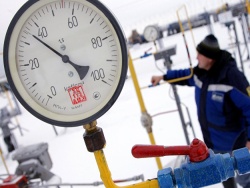The price of oil ceases to be critical for the Russian economy
Aleksey Topalov

Shutterstock
The factor of price fluctuations of oil losing its value for the Russian economy. Fluctuations in the range of $40-50, as sanctions have ceased to scare ordinary Russians and officials.
Oil prices go from the most quoted in the Russian news. The cost of “black gold” gone with record lows and hovering around $50. This figure apparently does not have such a frightening influence on Russian officials and analysts. The price is twice as less comfortable $100 are already as usual. For her to adapt, as well as sanctions. The Minister of economic development Alexei Ulyukayev admitted that he was “absolutely not interested” the decision of OPEC (the summit will take place in early June) on production of oil (quoted by RIA “Novosti”).
“In a period of stabilization of oil prices, they cease to have a significant impact on the overall economy (we are talking primarily about the economies of oil-producing countries, including Russia,” says Vladimir Tikhomirov, chief economist at FG BCS.
“A factor in oil prices as a factor affecting the state of the markets and the dynamics of the economy has weakened. And this is positive, since the less the volatility and the swings, the better for the financial markets and investment processes (primarily in the sense of planning),” agrees Yaroslav Lissovolik, chief economist at Eurasian development Bank.
When January (when prices fell below $29 a barrel) in early may, oil has risen more than 40%, it will definitely affect the profit of the companies-exporters and on the economy of countries in General, as the oil sector is also indirectly tied to financial, construction, transport sector, etc., says Tikhomirov. In addition, fluctuations of oil had a direct influence through exchange rates — as prices rise, the inflow of foreign currency (in this case dollars, as they denominated oil contracts. — “Газета.Ru”) in the country increases, respectively, the national currency strengthens. And this is already having an impact on inflation, the price level and real income.
However, in the last few weeks, when the price of a barrel is at $44-49, the role of oil prices has decreased significantly.
Since the beginning of the week the price of a barrel of Brent (it tied the price of Russian Urals) is around $49, but the psychological mark of $50 has not yet overcome. Oil has grown steadily since January, with the beginning of April the quotations stabilized at roughly $45, growth continued after the may holidays. Oil continued to rise, despite the failure of negotiations in Doha, Qatar, the 17th of April, where OPEC and some countries outside the cartel (primarily Russia), had to negotiate a freezing of the production level.
A support barrel provided as temporary factors: fires in Canada (oil Sands area), supply disruptions from Nigeria because of attacks by radical groups and the oil strike in Kuwait and fundamental: gradually decreasing the excess supply of the rising demand on the world oil market. One of the biggest “bears”, the investment Bank Goldman Sachs, in the beginning of the year forecast prices fall below $20 per barrel, now warns of a possible shortage in the oil market. Projected GS, in the second quarter of 2016 it will account for about 71 thousand barrels per day.
But do not rush to say that the oil completely (or at least long-term) balanced.
The same thing happened in the first half of last year, when the barrel and the ruble has stabilized, and in the second half again started falling.
We are not insured against a repetition of the situation, as the pressures on the price of oil, are still valid. “The first is the decrease of economic growth in China, entailing reduced demand for oil. Secondly, more and more signals that the Federal reserve is ready to raise rates, and this will lead to the strengthening of the dollar and corresponding weakening of oil prices. Plus we have a new factor: a possible British exit from the EU”, — said Lissovolik.
In this regard, investors can take a so-called flight from risk, particularly of commodities, that will undermine the position of oil.








